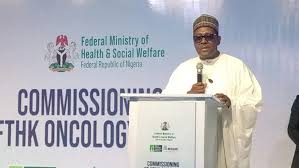Abuja | July 29, 2025 — In a major move to ease the burden of cancer treatment in Nigeria, the Federal Government has unveiled a new subsidy scheme offering up to N400,000 per patient to support the cost of managing cancer. The initiative is part of a broader national cancer care strategy designed to improve access to life-saving treatment and reduce out-of-pocket expenses for affected citizens.
The development was announced on Monday by Dr. Uche Nnaji, Director of the National Cancer Control Programme under the Federal Ministry of Health and Social Welfare, during a stakeholder engagement in Abuja. He confirmed that the subsidy will be administered through the Cancer Health Fund (CHF), which currently supports operations at six designated tertiary health facilities across the country.
According to Dr. Nnaji, each patient enrolled under the programme will receive a subsidy of N400,000 to cover diagnostic services, chemotherapy, radiotherapy, and surgical interventions. So far, over 1,400 patients have benefited from the fund since its inception, and the number is expected to grow significantly with renewed government backing.
In a further push to decentralize cancer care, Dr. Nnaji disclosed that the Federal Government plans to establish seven additional oncology centres by the year 2026. These centres will be strategically distributed across geopolitical zones to address the critical shortage of functional cancer treatment facilities in the country.
“President Bola Tinubu’s administration is committed to strengthening Nigeria’s health system through equitable access to quality care,” Dr. Nnaji stated. “Our goal is to ensure that no Nigerian has to travel long distances or bear unbearable costs just to stay alive.”
Cancer remains a leading cause of death in Nigeria, with breast, cervical, prostate, and colorectal cancers being the most common. Limited awareness, late presentation, and inadequate treatment infrastructure have contributed to poor outcomes, making government support essential.
Health advocates and stakeholders welcomed the announcement as a timely intervention, noting that it signals a more compassionate and responsive approach to healthcare financing in the country. Many also called for increased public awareness, data tracking, and sustained funding to ensure the initiative’s long-term success.
